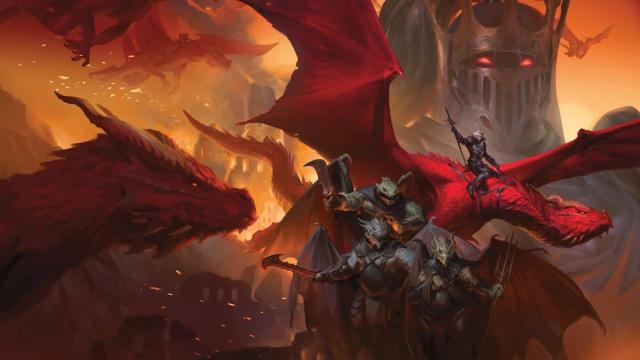Responding quickly to widespread concern online, Wizards of the Coast has released a statement on DnDBeyond clarifying some misconceptions that have been spread around Dungeons & Dragons’ Open Gaming Licence (OGL).
Currently there is no OGL released for the newest edition of D&D, which is currently in playtesting. After reports from a investor’s roundtable earlier in the year called D&D “under-monetized,” according to Chase Carter of Dicebreaker, people got worried about what that could mean.
After NerdImmersion posted a video sharing an email requesting a company meet with Wizards of the Coast with a non-disclosure agreement attached, third-party Dungeons & Dragons creators raised concerns on Twitter that the OGL they use to create their products would be changing. Even if the panic was widespread and a little premature — remember, the OGL for Fifth Edition didn’t come out until 2016, two years after 5e was published — the fear is valid. The OGL is the backbone of many TTRPG creators’ livelihoods, and its existence has helped establish the careers of thousands of writers, artists, and streamers.
According to Wizards of the Coast, however: “The OGL is not going away. You will still be able to create new D&D content, publish it anywhere, and game with your friends and followers in all the ways that make this game and community so great. The thousands of creators publishing across Kickstarter, DMsGuild, and more are a critical part of the D&D experience, and we will continue to support and encourage them to do that through One D&D and beyond.”
The announcement that the OGL is coming back, just with some edits and adjustments, really addresses most of the concerns that third-party creators have voiced. Essentially very little will be changing — most creators will be able to continue to engage with D&D and profit off their work in the same way that they always have.
As the Wizards of the Coast statement explains, caveats do start to kick in for creators making over $US50,000 ($69,410) in profit using products that use the OGL. If you make over 50K in profits, you must report your annual income to Wizards of the Coast. This will allow Wizards of the Coast to keep a thumb on the pulse of third-party products, and gives the company additional datasets for future products. Additionally if creators make over $US750,000 ($1,041,150) in profit — less than 20 people, according to the company — they will have to pay royalties starting in 2024. VTT companies and others who have custom agreements with Wizards will also be unaffected.
Additionally, creators will have to put an official OGL badge on their products, which will clarify what is and what isn’t One D&D compatible. While 5e creators have put “compatible with 5e” on their products for a while, codifying this is an interesting way to establish a community more in the official ecosystem. This will also remove some of the flavour that creators put into redesigning compatible with logos and logotypes.
Something else that will be changing under the new OGL: tightening up some of the language that has allowed for some products to come out that have not been covered under the OGL and have resided in kind of a nebulous grey area for a few years. Specifically, this includes miniatures, novels, and NFTs, all of which are not allowed under the OGL, and never have been.

Leave a Reply